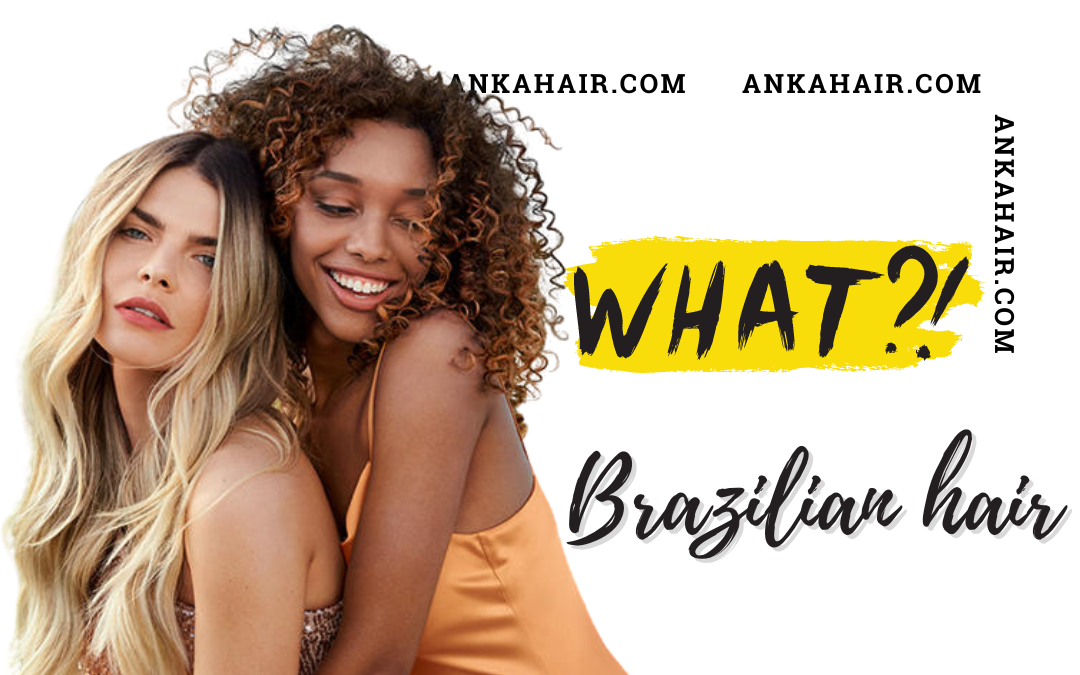Brazilian hair is a type of hair that is commonly use in wigs and extensions. It is a high-quality type of hair that holds a curl much better than other wig or extension hair types; it does not tangle easily and handles hair dye well. This hair is easy to style and maintain in good condition. Because it’s so thick, you often need fewer bundles to achieve that full, voluminous look. What more could anyone want? Brazilian hair is soft, thick, and lasts a long time. It’s easy to see why it’s currently the most popular hair type for wigs and weaves in South Africa. Brazilian hair is now one of the most visible types of hair extensions available. But where does Brazilian hair come from and does this multi-billion dollar industry have a huge risk of shady, poor quality, chemically processed hair suppliers?
In the air industry in general and Brazilian hair in particular, make sure to purchase 100% real, virgin, human hair. This particular type is unprocessed so it can be styled, colour-treated and maintained much easier.
1. Not every Brazilian hair comes from Brazil
People usually believe that Brazilian hair comes from Brazil as an obvious fact just like Vietnamese hair comes from Vietnam. Looking closely at the numbers, Brazil’s human hair exports account for only 0.74 percent of the market. It is literally impossible to claim that this hair sold all over the world comes from the heads of Brazilian girls. It is typically source from India or other global manufacturing behemoths such as China and certain Asian countries. Brazilian, Malaysian, and Peruvian hair, for example, are most likely branded to meet consumer demand for a specific curl pattern, texture, durability, softness, luster, and/or heat resistance.
This may come to a question, what exactly is Brazilian hair? It has a soft feel, medium luster, and thickness, as well as natural durability that holds well in a variety of temperatures and conditions. It is also a deep natural black color that closely resembles color (1B). According to a local, they guarantee that selling or donating hair is not part of this country culture.
Brazilian hair is perceived to be thicker, more flexible, and thus capable of a wider range of styles. Peruvian hair is typically describe as sleeker and more expensive than Brazilian’s. Curls are associate with Malaysian hair. The names Brazilian, Peruvian, and Malaysian are not associated with the origin; they are simply names that people associate with a specific “look and feel” when they hear them.
2. Types of Brazilian hair
- Curly Hair: Curly hair is the most appealing to both men and women. The bounce in a woman’s curls is enticing and seductive. Curly hair bundles can be worn with a variety of hair types. It’s silky, with a healthy shine and luster. It holds a curl exceptionally well.
- Straight Hair: This hair type is recommended if this is your first encounter with these extensions or you want maximum styling versatility with ease. In its natural state, straight hair is silky, soft and luxurious.
- Body Wave Hair: Virgin body wave hair will complement your natural hair perfectly. Because it is thick, it is difficult to break. This type of hair will last as long as you take care of it. It does not necessitate any special maintenance. It curls beautifully when wet and holds curls beautifully when dry.
- Deep Curly Hair: Brazilian hair is well-known for being one of the most desired textures on the market. Brazilian Deep Curly Hair is widely used due to its softness, durability, and density.
3. The differences between Vietnamese hair and Brazilian hair
The easiest way to tell is that unlike Brazilian hair, Vietnamese hair is quite original as from Anka hair 100% hair comes from Vietnamese hair. We always aim to produce beautiful Vietnamese virgin woman hair with great care. Our hair products (double dawn bulk hair, machine weft hair, hair wigs…) are favored by customers for the superb quality and best price. We assure your satisfaction and qualify all expectations of original women hair (unprocessed & natural hair), 100% yaki hair (no treatment, no chemical, no dyed, no bleached), 100% remy hair (no tangled hair, all hairs are same direction from root to tip).
Vietnamese hair stands out among all hair types on the planet with widely regarded as the world’s most durable and natural hair. Vietnamese hair is naturally beautiful black. It is easily dye and colore into various colors such as brown, blonde, gray,… or even purple and velvet red. It is defined as straight and thick. Straight Vietnamese hair is thought to be one of the simplest styling styles among all types of hair extensions. Some more Vietnamese virgin hair is naturally curly, but it is a little. Vietnamese hair can complement the hair textures of African American and European women. It is sturdy and thick.
Brazilian virgin hair is one of the most sought-after hair types in the world. The hair has a delicate texture, toughness, and thickness. Most West African countries prefer Brazil virgin hair. Brazilian virgin curly hair is another popular option. The curls are lovely and give the wearer a glamorous and amazing look. Brazilian hair holds curls beautifully and looks great on African American women. Brazilian hair weave has a gleaming appearance and feel. It is well-known for its full body, lovely bounce, and texture. Brazilian hair is typically available in wavy, straight, and curly textures. With proper care, the hair type can be kept for a longer period of time.
In short, whether you have Brazilian, Peruvian, Indian, Malaysian, or Vietnamese hair, it needs to be well protected, moisturized, and cared for. As a result, it can have as long a lifespan as possible. Your hair will be shiny and healthy. Knowing the differences between all hair types will assist you in selecting the best hair products for you. At Anka Hair, we sell 100% Vietnamese virgin hair that is shiny, silky, and smooth and has a lifespan of up to 5 years. Visit our website right now to see more beautiful products!



![Bee [English]](https://ankahair.com/wp-content/uploads/Hang-150x150.jpg)
![Rosie [English]](https://ankahair.com/wp-content/uploads/Linh-150x150.jpg)
![Ellie [English]](https://ankahair.com/wp-content/uploads/LANh-150x150.jpg)
![Wendy [English]](https://ankahair.com/wp-content/uploads/Tam-150x150.jpg)
![Kavin [English]](https://ankahair.com/wp-content/uploads/Cheiens-150x150.jpg)
![Linda [English]](https://ankahair.com/wp-content/uploads/Dan-150x150.jpg)
![Lily [English]](https://ankahair.com/wp-content/uploads/Trang-150x150.jpg)
![Kathy [English]](https://ankahair.com/wp-content/uploads/Yen-150x150.jpg)
![Harry [English]](https://ankahair.com/wp-content/uploads/z5931501956796_5e7cab9db0516d3858ece1dad95cc4e4-150x150.jpg)
![Gina [English]](https://ankahair.com/wp-content/uploads/WhatsApp-Image-2024-10-15-at-11.00.23-150x150.jpeg)
![Hannah [English]](https://ankahair.com/wp-content/uploads/WhatsApp-Image-2024-10-15-at-11.02.52-150x150.jpeg)
![Sarah [English]](https://ankahair.com/wp-content/uploads/Thiet-ke-chua-co-ten-2.jpg)
![Helen [English]](https://ankahair.com/wp-content/uploads/z5932531142190_b3987c9487c317035d38bccfe470682f.jpg)
![Kami [English]](https://ankahair.com/wp-content/uploads/Thiet-ke-chua-co-ten-3.jpg)
![Mimi [Français]](https://ankahair.com/wp-content/uploads/WhatsApp-Image-2023-04-14-at-15.48.06.jpeg)
![Jenny [English]](https://ankahair.com/wp-content/uploads/IMG_20150423_104647.jpg)
![Sveta [Russian, English]](https://ankahair.com/wp-content/uploads/IMG_8318.jpg)
![Katia [Russia, English]](https://ankahair.com/wp-content/uploads/Thiet-ke-chua-co-ten-1-2.jpg)
![Karina [Portuguese,English]](https://ankahair.com/wp-content/uploads/Thiet-ke-chua-co-ten-1-1.jpg)
![Rosa [English]](https://ankahair.com/wp-content/uploads/Thiet-ke-chua-co-ten-4.jpg)
![Sophia [English]](https://ankahair.com/wp-content/uploads/8.jpg)
![Amy [English]](https://ankahair.com/wp-content/uploads/Them-tieu-de.jpg)
![Jesse [English]](https://ankahair.com/wp-content/uploads/9.jpg)
![Alice [English]](https://ankahair.com/wp-content/uploads/z3004302860179_951e928914aeb509a9a72897ed6d2e4c.jpg)
![Anna [English]](https://ankahair.com/wp-content/uploads/Them-tieu-de-3.jpg)
![Lily [English]](https://ankahair.com/wp-content/uploads/Them-tieu-de-1.jpg)

